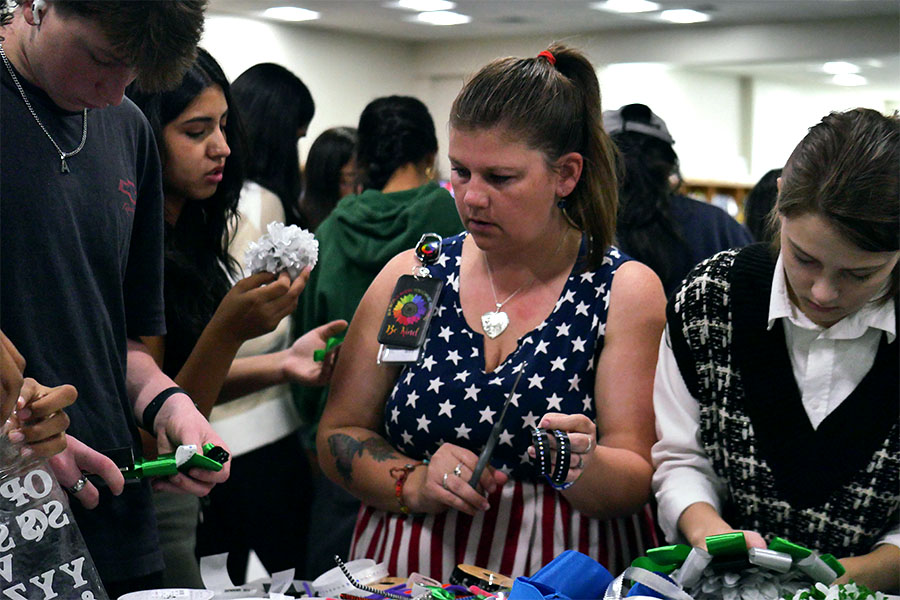A Ban Against Rights
Texas Trans Childcare Law Only Exists to Harm
Photo Courtesy of Filmbetrachter on Pixabay
In February, Texas Gov. Greg Abbott and Attorney General Ken Paxton declared that gender-affirming treatment like hormone therapy for transgender individuals would constitute as child abuse and be pursued under the fullest extent of the law. According to Abbott, the ban is meant to protect children from harm, but according to modern medical consensus it will have the opposite effect. Much needs to be done to ensure that trans youth in Texas are supported.
March 25, 2022
Right now, the majority of news feeds are inundated with stories about the Russian invasion of Ukraine, a situation where Russia is violating the sovereignty of Ukraine and heartlessly bombing its civilians in an effort to impose its will on the country and halt its efforts to become a free, democratic state. However, other insidious overreaches of power can be found across the world. And like the transgender childcare ban ordered by Texas Gov. Greg Abbott, some of them may be closer to home than you think.
Declared as a new interpretation of existing laws, the ban criminalizes providing or aiding in providing gender-affirming health care to transgender children. Gender-affirming health care is any medical procedure which aids a trans individual in their gender transition, from hormone therapy to surgeries which make their bodies more closely resemble those of the desired sex. Any adult found guilty of these actions will be charged with child abuse, and could possibly get two to 20 years in prison and a $10,000 fine.
This is nothing new for Texas. The state under Abbott has pursued a number of measures aimed at restricting the rights of trans individuals and, in general, at restricting what Texas citizens are allowed to see, say and do under the guise of “protecting” whichever group they can use as a justification. H.B. 25, a bill which mandates trans individuals playing on the sports team of their assigned sex at birth was passed last year and came into effect in 2022. Lt. Gov. Dan Patrick has expressed support for allowing the University of Texas at Austin to revoke the tenure of professors who teach critical race theory, a legal theory which says that racism is embedded into the American legal system. The state has not been very good at what defining CRT is, seeing as the legislature passed a bill last year which banned discussing all current events in school unless teachers gave “deference to both sides” while citing CRT as the impetus for the bill. And, of course, the legislature also passed one of the most restrictive abortion laws in the country last year.
While some of these are clearly meant to placate the conservative side of the culture war, the battle between the American right and left to enact their desired social policies like vaccine mandates and CRT bans, they could be justified as not giving trans athletes an unfair advantage or keeping schools politically neutral. The new interpretation of child abuse, on the other hand, has no such justification.
Although Abbott and Texas Attorney General Ken Paxton say it protects children, gender-affirming care has been shown to improve the lives of trans youth and decrease their risk of developing depression or committing suicide, according to the ACLU. According to Reuters, trans youth are already a group disproportionately likely to commit suicide due to social stigma, and they need this care as much as possible in order to aid both their own self-perception and their treatment by the wider public. Take these measures away, and kids who feel as if they are trapped in their own body have no path towards attaining the care that they deserve. The ban is a punitive policy where Abbott focused on scoring political points rather than considering the needs of marginalized trans Texas youth.
Within the opinion by Paxton regarding medical treatment of trans youth, he provides a litany of reasons why giving them potentially life-saving care should be interpreted as child abuse. The most prominent of them is the fact that when a trans youth and their parents consent to hormone therapy or gender reassignment surgery, their reproductive system is often rendered inoperable, effectively sterilizing them for life. This, Paxton argues, is such a monumental decision that kids can never be trusted to consent to treatment and would constitute as child abuse if a parent approved the decision. However, it ignores everything that happens before gender-affirming care.
There is a complex and thorough vetting process that trans youth must undergo before they and their parents can consider treatments like hormone therapy. There must be a well-documented history of the individual’s gender dysphoria, or the individual feeling like their gender and their biological sex are mismatched, and it must be diagnosed by a mental health professional. It is not like trans youth are choosing to become physically weaker, sterilize themselves, or give themselves any other side effect which is known to come from gender-affirming medical care without second thought; their parents, the two individuals who know them best, must approve the decision, and doctors must notify them of side effects. Sterilization is often a small price to pay for the mental health issues and stigma that arise from not having access to care. Gender reassignment surgery is not dangerous to trans youth just because, as Paxton cites, Medicare services have not determined whether or not it is.
Paxton cites the importance of the sterilization decision and the regret that many trans individuals have after transitioning. However, according to the International Society for Sexual Medicine, only 1% of trans people actually regret transitioning, and other studies conclude with similar numbers. These fringe cases do not justify banning a medically necessary procedure for thousands of trans Texans. I cannot imagine that if someone was in a car crash, it would be logical to ban cars.
There has been a great deal of backlash both statewide and nationwide. A district judge in Texas ruled this March that providing gender-affirming care was not a reason to investigate nine families who had provided this care to their children, if only temporarily. President Biden tweeted in support of trans youth after the news broke out and directed the U.S. Department of Health and Human Services to use the full force of the law to deliver trans youth the care they need. Personally, I’m glad that other government institutions recognize how absurd this policy is, and it has been one of the Biden presidency’s high points.
Despite these measures, life may still become very challenging for trans youth in Texas. First and foremost, citizens can use the power of the vote to elect local representatives who aim to pass pro-trans medical care laws and defy Abbott’s order. They can organize at the local and state level to pass referendums or voter initiatives which bolster trans rights as well. However, a level even lower than local which is crucial to cover is the personal level – if you know any trans youth who will be affected, give them support and let them know that you’re on their side. Direct them to support groups like Trans Lifeline, The Trevor Project, or the National Center for Transgender Equality so that they can have access to crisis hotlines and legal information regarding trans citizens.
It is not for certain if there will be a light at the end of the tunnel, as this egregious overreach of power could imply even bigger existential threats down the road. As such, even if history vindicates trans youth at the end, in the present moment you must be the barrier between them and further state overreach. To Abbott, the ban was a political move. Yet, it is much more than a political issue to trans youth, and supporting them means not just political solutions, but solutions to the daily threat that this policy presents to their lives.










![Broadcast, yearbook and newspaper combined for 66 Interscholastic League Press Conference awards this year. Yearbook won 43, newspaper won 14 and broadcast took home nine. “I think [the ILPC awards] are a great way to give the kids some acknowledgement for all of their hard work,” newspaper and yearbook adviser Paige Hert said. “They typically spend the year covering everyone else’s big moments, so it’s really cool for them to be celebrated so many times and in so many different ways.”](https://cphswolfpack.com/wp-content/uploads/2025/05/edited-ILPC.jpg)





![Looking down at his racket, junior Hasun Nguyen hits the green tennis ball. Hasun has played tennis since he was 9 years old, and he is on the varsity team. "I feel like it’s not really appreciated in America as much, but [tennis] is a really competitive and mentally challenging sport,” Nguyen said. “I’m really level-headed and can keep my cool during a match, and that helps me play a bit better under pressure.” Photo by Kyra Cox](https://cphswolfpack.com/wp-content/uploads/2025/09/hasun.jpg)

![Bringing her arm over her head and taking a quick breath, junior Lauren Lucas swims the final laps of the 500 freestyle at the regionals swimming competition on date. Lucas broke the school’s 18-year-old record for the 500 freestyle at regionals and again at state with a time of 4:58.63. “I’d had my eye on that 500 record since my freshman year, so I was really excited to see if I could get it at regionals or districts,” Lucas said. “ State is always a really fun experience and medaling for the first time was really great. It was a very very tight race, [so] I was a bit surprised [that I medaled]. [There were] a lot of fast girls at the meet in general, [and] it was like a dogfight back and forth, back and forth.” Photo by Kaydence Wilkinson](https://cphswolfpack.com/wp-content/uploads/2025/03/Kaydence-2.7-23-edit-2.jpg)
![As her hair blows in the wind, senior Brianna Grandow runs the varsity girls 5K at the cross country district meet last Thursday. Grandow finished fourth in the event and led the varsity girls to regionals with a third place placement as a team. “I’m very excited [to go to regionals],” Grandow said. “I’m excited to race in Corpus Christi, and we get to go to the beach, so that’s really awesome.” Photo by Addison Bruce](https://cphswolfpack.com/wp-content/uploads/2025/10/brianna.jpg)





























